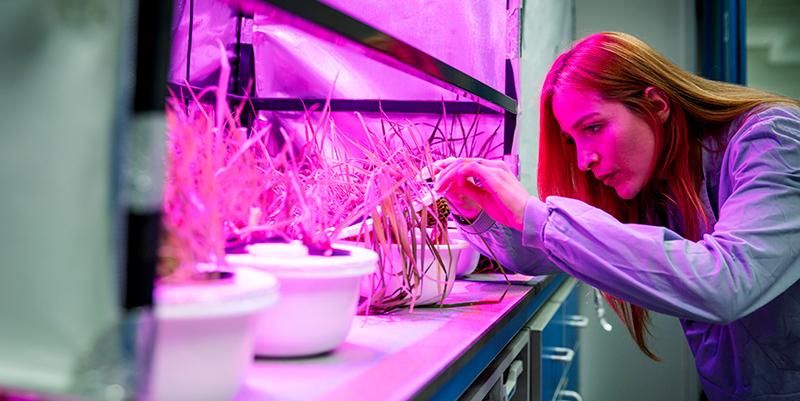Our work on agri-energy systems

Agriculture accounts for a significant and difficult to decarbonise proportion of both the UK and University of Leeds carbon footprint. Energy is central to decarbonising agriculture and yet there is relatively little research in this area.
Many existing renewable technologies are poorly suited to direct deployment on working farms. Feedstocks are likely to be impure, the environment is hostile, and systems must be automated and self-contained. To enable widespread adoption, solutions need to be commercially viable and demonstrated in real world environments.
A widespread transition to sustainable energy sources is critical and developing improved renewable energy technologies to meet on-farm demands has obvious potential. There are also exciting opportunities that could see the sector supporting wider rural decarbonisation with farms acting as rural decentralised energy hubs for their communities, exporting renewable electricity and hosting localised production of biohydrogen and other biofuels.
Energy is central to many of the innovations that will deliver sustainable agriculture.”
Making critical connections
Bringing together a wealth of interdisciplinary expertise at the University of Leeds with partners from across the farming and energy sectors, we are developing innovative solutions that can help to decarbonise both the University Research Farm and the wider sector across the UK.
Energy Leeds and the Global Food and Environment Institute (GFEI) are working together to establish the University of Leeds as a leader in agri-energy systems. Our approach builds on the University’s existing energy research strengths including processing of waste and slurry, the development of alternative fuels such as biohydrogen, renewable energy systems, transport decarbonisation, energy storage and smart energy systems.
Video transcript: Agricultural Energy Systems Research
At the University Research Farm, we are creating a Net Zero Agriculture Living Lab that can rapidly deploy and test solutions for decarbonising agri-energy systems.
In the short term, we are scoping the farm-level opportunities for energy demonstration on the smart farm, matching this with our facilities and academic expertise in energy, climate and agriculture.
Through a programme of workshops and research development, we are engaging staff, students and other external partners to co-create our long-term vision and identify challenges and opportunities for agri-energy research and development.
Deploying agri-energy systems
Our on-farm demonstrator facility addresses a clear gap in agri-energy technology development, as well as helping the University to achieve net zero emissions by 2030.
This builds critical capacity to develop, pilot and integrate new technologies that address the challenges of:
- understanding energy needs of farms and particular challenges of decarbonising agricultural energy systems
- recovering energy from slurry and organic farm waste to produce low-carbon fuels including biohydrogen
- recycling nutrients and food waste as fertilisers
- developing and demonstrating innovative low emissions farm vehicles and machinery
- demonstrating farm scale renewable energy systems in a real-world agricultural context
- developing resilient, integrated smart rural energy systems.
We are keen to collaborate with industry partners to develop and demonstrate new energy technologies at our Research Farm. Please get in touch to discuss how we can work together to help decarbonise agricultural energy systems.
Renewable energy for farming communities
Agricultural waste has a high energy content, and building on our extensive track record in bioenergy research we are working on innovative ways to recover and utilise this energy. Researchers in the School of Chemical and Process Engineering are using expertise hydrothermal, thermochemical and biological processing of biomass and waste to explore potential of pig slurry produced at our National Pig Centre to be used as an energy source.
Researchers in the School of Civil Engineering are developing new technologies that could produce biohydrogen as a transport fuel from organic wastes, including farm waste through a major new investment from DESNZ. Read our case study about phase one of the H2Boost project.
To meet the future energy distribution needs of rural farming communities, researchers in the School of Electronic and Electrical Engineering are analysing the energy demands of a working farm to understand the potential for smart mobile charging units which could provide a reliable energy source in remote locations.
National and global challenges
Alongside developing on-farm opportunities for agri-energy, our qualitative and quantitative research seeks to understand the scale and nature of agri-energy ecosystems nationally, including the role of research and innovation. To help develop and scale up economically viable solutions for climate-neutral and climate-resilient farms, our researchers also lead a programme of work in the EU-funded ClieNFarms project, which aims to co-develop and scale up systemic, locally relevant solutions to foster climate-neutral and climate-resilient farms across Europe.
Read more about how researchers in the School of Biology are informing the research and policy agenda for decarbonising the UK’s wider agrifood system by convening the UKRI-funded AgriFood4NetZero+ Network.